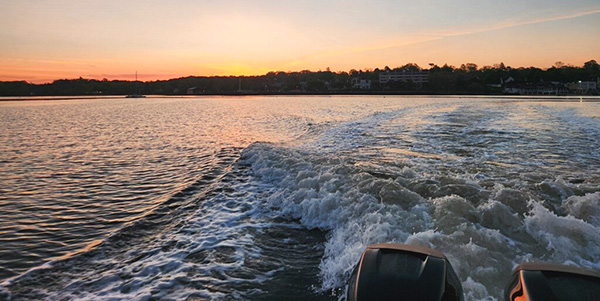
A year ago, Ameera Khan was ready for the start of the Unified Water Study season, her first managing the field and group coordination elements of our Long Island Sound-wide water monitoring program. This year, she’s even more prepared.
That’s what a season’s worth of experience will do for you. It’s not that she expects there won’t be the same curveballs she encountered last year. It’s that Ameera now appreciates the crucial part that adaptability and flexibility play in coordinating 27 monitoring groups (including Save the Sound) covering 46 bays and harbors.
“I feel so much more confident in myself, and our team has grown so much. We have so much help in the lab and in the field,” Ameera, our environmental analyst, said last week, just after the 2024 UWS season got underway on May 1.
Save the Sound launched the UWS back in 2017 with the goal of standardizing procedures for measuring water quality for monitoring groups around the Sound. Having the same information collected the same way using the same instruments ensures a consistency of data, enabling us to make apples to apples comparisons of the environmental health of bays and harbors from Wequeteqock Cove near Connecticut’s border with Rhode Island to the western Narrows of New York City. This year’s UWS reach will extend even further with the addition of the Fishers Island Seagrass Management Coalition, who will monitor West Harbor on the island 30 miles northeast of Orient Point.
That data is available on our website [https://www.savethesound.org/water-monitoring-ecological-health] and are used to create the bay grades for our biennial Long Island Sound Report Card. Look for a new report this fall!
Training all the groups to use the monitoring equipment and making sure everyone does their requisite number of trips during the six-month season, Ameera learned, may be the easy part of the job. What she is far more prepared for this year are the unexpected but inevitable interruptions to the monitoring schedule. Sometimes it’s an illness or an unforeseen conflict. More often, it’s the weather.
Throughout the days before she planned to head out on the Terry Backer I to collect data in New Rochelle Harbor, Hunter Island Bay, and Eastchester Bay, Ameera tracked the forecast up until 9:00 p.m. She checked again when she woke up (4:00 a.m. in the early season, an hour later as the summer days shortened), making sure there wasn’t a small craft advisory or other conditions that would lead to calling off a morning of sampling.
But even calm seas don’t guarantee smooth sailing. Boat engines, for instance, can be temperamental, and Ameera spent last season becoming fluent in her boat’s specific intricacies.
As much as anything, it’s those experiences—hers and the ones she regularly heard about from crews around the Sound—that have Ameera feeling ready to roll as the new season begins.
“We started training a little earlier this year, to provide groups with additional time to prepare themselves, get familiar with the sonde, work out their own sampling schedules,” Ameera said. “I’m excited to see what everyone brings to the table, and I’m excited for the 2024 season.”
